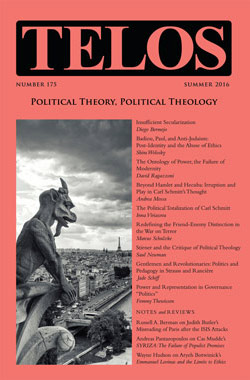Diego Bermejo’s “Insufficient Secularization” appears in Telos 175 (Summer 2016). Read the full article at the Telos Online website, or purchase a print copy of the issue in our online store.
 The primary aim of this article is to provide a summary of the theoretical framework in which the present debate between secularism and religion is situated, especially in Europe. It first examines the standard theory of secularization and the cultural triumph of secularism, analyzing its assumptions and implications. Next, it presents a critique of the standard theory of secularization, showing the shortcomings and inadequacies of that theory as a sociological theory, a theory of religion and a theory of reason. Finally, it concludes pointing out the democratic contradictions offered by a radical secularization theory, showing its insufficiencies as much as it leads to the ideology of secularist fundamentalism that claims for itself the monopoly of theoretical and practical rationality. The process of secularization is insufficient if, voided of its original pathos, it leads to any form of sacralization of the immanence. Secularism becomes insufficient, if not harmful, in the same way as religious fundamentalism, if it becomes an obstacle to building pluralistic coexistence. Therefore, secularism should acknowledge the emergence of religious challenges. Religion has found, in the crisis of reason (metaphysical, scientific, and political), an opportunity not only to be present in the public sphere, but also to demand the right to equal treatment—appealing to the same democratic principles of secularism—and the right to political participation. Secularism cannot respond to these challenges with another form of “enlightened fundamentalism.”
The primary aim of this article is to provide a summary of the theoretical framework in which the present debate between secularism and religion is situated, especially in Europe. It first examines the standard theory of secularization and the cultural triumph of secularism, analyzing its assumptions and implications. Next, it presents a critique of the standard theory of secularization, showing the shortcomings and inadequacies of that theory as a sociological theory, a theory of religion and a theory of reason. Finally, it concludes pointing out the democratic contradictions offered by a radical secularization theory, showing its insufficiencies as much as it leads to the ideology of secularist fundamentalism that claims for itself the monopoly of theoretical and practical rationality. The process of secularization is insufficient if, voided of its original pathos, it leads to any form of sacralization of the immanence. Secularism becomes insufficient, if not harmful, in the same way as religious fundamentalism, if it becomes an obstacle to building pluralistic coexistence. Therefore, secularism should acknowledge the emergence of religious challenges. Religion has found, in the crisis of reason (metaphysical, scientific, and political), an opportunity not only to be present in the public sphere, but also to demand the right to equal treatment—appealing to the same democratic principles of secularism—and the right to political participation. Secularism cannot respond to these challenges with another form of “enlightened fundamentalism.”








